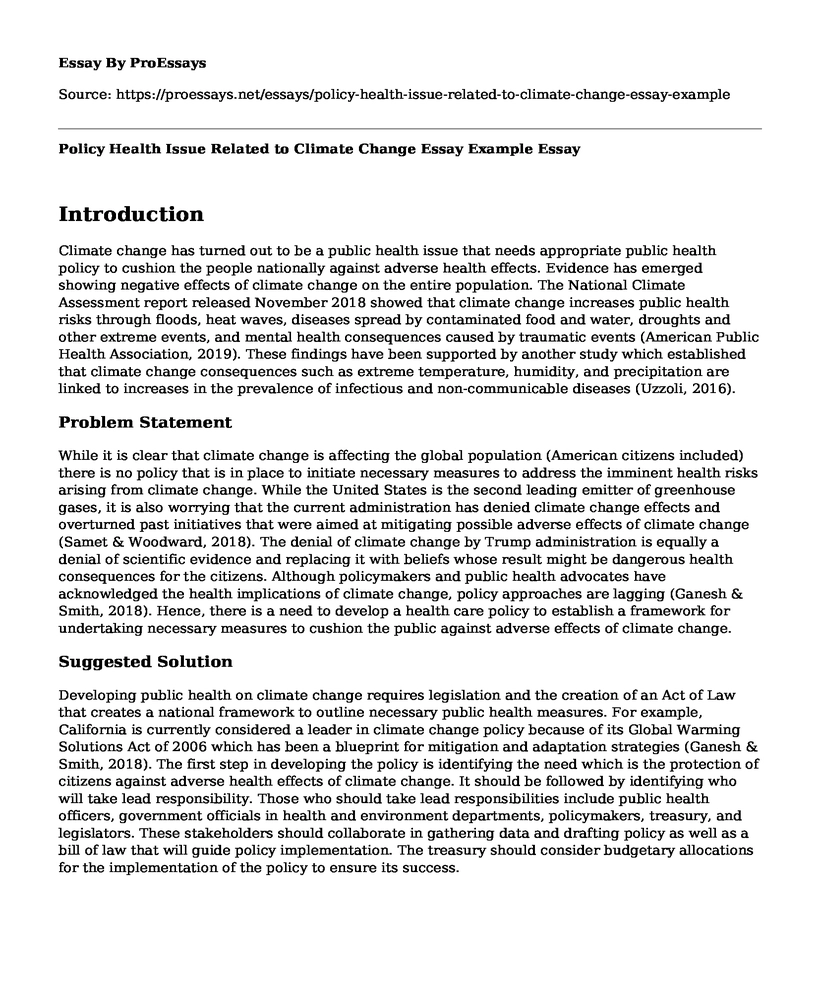Introduction
Climate change has turned out to be a public health issue that needs appropriate public health policy to cushion the people nationally against adverse health effects. Evidence has emerged showing negative effects of climate change on the entire population. The National Climate Assessment report released November 2018 showed that climate change increases public health risks through floods, heat waves, diseases spread by contaminated food and water, droughts and other extreme events, and mental health consequences caused by traumatic events (American Public Health Association, 2019). These findings have been supported by another study which established that climate change consequences such as extreme temperature, humidity, and precipitation are linked to increases in the prevalence of infectious and non-communicable diseases (Uzzoli, 2016).
Problem Statement
While it is clear that climate change is affecting the global population (American citizens included) there is no policy that is in place to initiate necessary measures to address the imminent health risks arising from climate change. While the United States is the second leading emitter of greenhouse gases, it is also worrying that the current administration has denied climate change effects and overturned past initiatives that were aimed at mitigating possible adverse effects of climate change (Samet & Woodward, 2018). The denial of climate change by Trump administration is equally a denial of scientific evidence and replacing it with beliefs whose result might be dangerous health consequences for the citizens. Although policymakers and public health advocates have acknowledged the health implications of climate change, policy approaches are lagging (Ganesh & Smith, 2018). Hence, there is a need to develop a health care policy to establish a framework for undertaking necessary measures to cushion the public against adverse effects of climate change.
Suggested Solution
Developing public health on climate change requires legislation and the creation of an Act of Law that creates a national framework to outline necessary public health measures. For example, California is currently considered a leader in climate change policy because of its Global Warming Solutions Act of 2006 which has been a blueprint for mitigation and adaptation strategies (Ganesh & Smith, 2018). The first step in developing the policy is identifying the need which is the protection of citizens against adverse health effects of climate change. It should be followed by identifying who will take lead responsibility. Those who should take lead responsibilities include public health officers, government officials in health and environment departments, policymakers, treasury, and legislators. These stakeholders should collaborate in gathering data and drafting policy as well as a bill of law that will guide policy implementation. The treasury should consider budgetary allocations for the implementation of the policy to ensure its success.
Impact on the Healthcare System
The development and passing of public health policy on climate change will have a huge impact on the care delivery system. It will ensure that the health effects of climate change are integrated into health policy and planning. For example, in California, the Global Warming Solutions Act of 2006 ensured that adaptation measures were integrated with related government policies such as disaster preparedness, water management and land-use planning (Ganesh & Smith, 2018). This will allow public health officials to take proactive measures to prevent diseases and ailments arising from climate change effects.
Also, the policy will enhance the coordination of climate change efforts as well as awareness creation of climate change effects among the citizens. Public health policy on climate change creates a foundation for public health officials to work with the public health department to identify public health risks in communities, and build awareness as well as document climate change efforts (Marinucci, Luber, Uejio, Saha, & Hess, 2014). This will boost the sensitization of communities on health risks and initiate protective health measures at the household level.
References
American Public Health Association. (2019). National Climate Assessment grave reminder of action needed to protect public health from climate change. Retrieved from https://apha.org/news-and-media/news-releases/apha-news-releases/2018/national-climate-assessment-2018
Ganesh, C., & Smith, J. A. (2018). Climate change, public health, and policy: a California case study. American Journal of Public Health, 108(S2), S114-S119. doi: 10.2105/AJPH.2017.304047
Marinucci, G., Luber, G., Uejio, C., Saha, S., & Hess, J. (2014). Building resilience against climate effects-a novel framework to facilitate climate readiness in public health agencies. International Journal of Environmental Research and Public Health, 11(6), 6433-6458. https://www.ncbi.nlm.nih.gov/pubmed/24991665
Samet, J. M., & Woodward, A. (2018). National Government Denial of Climate Change and State and Local Public Health Action in a Federalist System. American Journal of Public Health, 108(2), 232-240. doi: 10.2105/AJPH.2018.304395
Uzzoli, A. (2016). Effects of climate change on health-a case study in Hungary. Gradus, 3(1), 284-289. www.regscience.hu:8080/xmlui/bitstream/handle/11155/.../uzzoli-effects_2016.pdf?
Cite this page
Policy Health Issue Related to Climate Change Essay Example. (2022, Dec 18). Retrieved from https://proessays.net/essays/policy-health-issue-related-to-climate-change-essay-example
If you are the original author of this essay and no longer wish to have it published on the ProEssays website, please click below to request its removal:
- Essay on Political Science: Ways to Increase Voter Turnout
- What Is the Impact of US Government on the Future and Operations of OPEC? Essay
- Essay Example on What Are the Stages of Breast Cancer?
- Nurses' Empowerment: Motivating & Demotivating Factors in the Workplace - Essay Sample
- Essay Example on China's Pollution Menace: PM2.5, Motor Vehicles,Industry, Fossil Fuels
- Essay Example on Vegetarianism: Reasons, Rules & Health Benefits
- Lead Contamination: Impacts on Health, Environment, and Communities - Essay Sample







